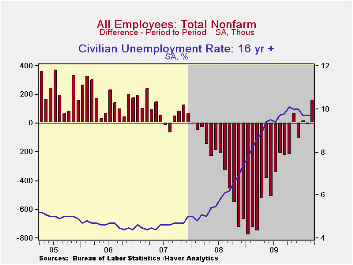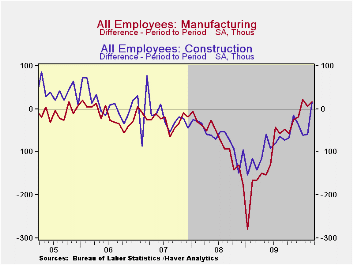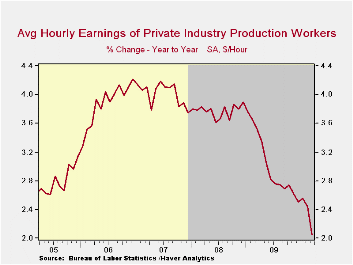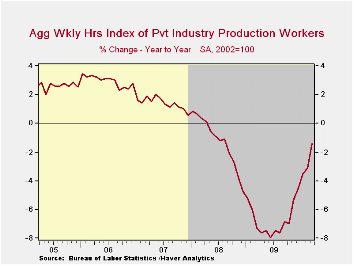 Global| Apr 02 2010
Global| Apr 02 2010U.S. Job Market Firms; Jobless Rate Is Steady And Payrolls Rise
by:Tom Moeller
|in:Economy in Brief
Summary
The Bureau of Labor Statistics reported that, all-in-all, labor market conditions firmed somewhat more-than-expected last month. From the household survey, the unemployment rate held steady for the third month at an expected 9.7%, [...]


The Bureau of Labor Statistics reported that, all-in-all, labor market conditions firmed somewhat more-than-expected last month. From the household survey, the unemployment rate held steady for the third month at an expected 9.7%, down from the October high of 10.1%. That stability owed to improved hiring. Employment rose 264,000 (-1.4% y/y) for the third consecutive monthly gain. These increases follow monthly declines of as much as 967,000 during the recession. In addition, improved hiring is prompting an expansion of the labor force. The 398,000 gain (-0.2% y/y) was the largest of three consecutive monthly increases. Throughout 2009 the labor force contracted slightly. The gain reflects a rise in the labor force participation rate to 64.9%, its third month of increase following steady declines last year.
The establishment survey also painted a picture of an improved job market. To start, payrolls expanded 162,000. Though the gain was slightly less-than-expected, the increase followed a lessened decline of 14,000 in February. Also, a slight decline in January payrolls was revised to a small increase. The real surprise, however, was that Census workers contributed just 48,000 to last month's payroll gain and that raised government hiring by 39,000 (-0.3% y/y). Therefore, private-sector jobs expanded 123,000 (-2.1% y/y), the biggest of four gains in the last five months.
The payroll gain reflected an 82,000 increase in private-services. It was the fourth increase in the last five months after severe weather dampened February hiring. Temporary jobs rose 40,200 (8.9% y/y) for the sixth consecutive monthly increase. Construction jobs benefitted from the weather as well with a 15,000 increase, though it was the first gain since early-2007. Factory sector employment also firmed and the 17,000 rise was the third consecutive monthly increase.
The total workweek bounced back after the storm and earlier numbers were upwardly-revised. The gain to 34.0 hours pulled the workweek to its longest in twelve months. Combined with the gain in employment, aggregate hours worked rose 0.7% and by 0.4% last quarter.
Average hourly earnings fell 0.1% and reversed the February increase. It was the first monthly decline since 2003 and lowered the y/y gain to 2.1%, its weakest since early-2004.


| Employment: 000s | March | February | January | Y/Y | 2009 | 2008 | 2007 |
|---|---|---|---|---|---|---|---|
| Payroll Employment | 162 | -14 | 14 | -1.8% | -4.3% | -0.6% | 1.1% |
| Previous | -- | -36 | -26 | -- | -- | -- | -- |
| Manufacturing | 17 | 6 | 22 | -5.2% | -11.3% | -3.4% | -2.0% |
| Construction | 15 | -59 | -60 | -11.1% | -15.7% | -6.1% | -0.8% |
| Private Service Producing | 82 | 55 | 46 | -1.0% | -3.4% | -0.2% | 1.7% |
| Government | 39 | -22 | -2 | -0.3% | 0.2% | 1.3% | 1.1% |
| Average Weekly Hours | 34.0 | 33.9 | 34.0 | 34.0(March '09) | 33.1 | 33.6 | 33.8 |
| Average Hourly Earnings | -0.1% | 0.1% | 0.3% | 2.1% | 3.0% | 3.8% | 4.0% |
| Unemployment Rate | 9.7% | 9.7% | 9.7% | 8.6%(March '09) | 9.3% | 5.8% | 4.6% |
Tom Moeller
AuthorMore in Author Profile »Prior to joining Haver Analytics in 2000, Mr. Moeller worked as the Economist at Chancellor Capital Management from 1985 to 1999. There, he developed comprehensive economic forecasts and interpreted economic data for equity and fixed income portfolio managers. Also at Chancellor, Mr. Moeller worked as an equity analyst and was responsible for researching and rating companies in the economically sensitive automobile and housing industries for investment in Chancellor’s equity portfolio. Prior to joining Chancellor, Mr. Moeller was an Economist at Citibank from 1979 to 1984. He also analyzed pricing behavior in the metals industry for the Council on Wage and Price Stability in Washington, D.C. In 1999, Mr. Moeller received the award for most accurate forecast from the Forecasters' Club of New York. From 1990 to 1992 he was President of the New York Association for Business Economists. Mr. Moeller earned an M.B.A. in Finance from Fordham University, where he graduated in 1987. He holds a Bachelor of Arts in Economics from George Washington University.
More Economy in Brief
 Global| Feb 05 2026
Global| Feb 05 2026Charts of the Week: Balanced Policy, Resilient Data and AI Narratives
by:Andrew Cates






